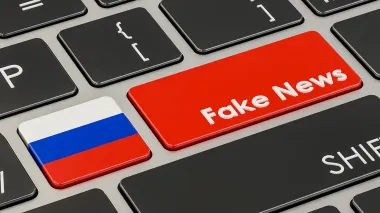Sanctioned Russian media still accessible in EU – report

Websites of banned Russian media outlets remain easily accessible in the EU in the "overwhelming majority" of cases, according to a report released by the London-based Institute for Strategic Dialogue (ISD).
Source: Euractiv, a EU-focused news and analysis website, as reported by European Pravda
Details:The report notes that after Russia invaded Ukraine in February 2022, the EU authorities banned Kremlin-controlled media from broadcasting within the Union, including online, to counter "disinformation".
However, more than three years later, "sanctioned outlets are largely still active and accessible" in member states, the report says. "Russian state media continues to maintain a strong online presence, posing a persistent challenge to Western democracies," it adds, noting that internet service provider (ISP) blocking is "largely ineffective".
The EU sanctions targeted RT, formerly known as Russia Today, and Sputnik, along with other state-controlled outlets, accused of conducting an "information warfare".
The ISD report covered Germany, France, Italy, Poland, Czechia and Slovakia, testing the three largest internet providers in each of these countries.
The researchers identified 26 sanctioned media outlets and attempted to access 58 associated domains. In 76% of tests, providers failed to block access.
Member states are responsible for ensuring that ISPs enforce the bans. However, the ISD report criticises the European Commission for its "failure" to maintain a "definitive list of different domain iterations" or web addresses linked to each outlet.
The lack of such a list has left countries and ISPs "without the guidance needed for effective and targeted implementation", the report states.
"The issue is when they sanction Russian state media, they mention the outlet that they are sanctioning – so Russia Today, Sputnik, etc – but what they don't list is what domain falls under this entity," said Pablo Maristany de las Casas, the report’s author.
"If the European Commission were to list the different domains that are known to be linked to these entities, that would make it much easier for member states and the internet service providers in those member states to enforce these blocks," he added.
The report calls on the European Commission to release a "continuously updated and publicly accessible list" and include it in its sanctions packages and on its online sanctions dashboard.
Maristany de las Casas says enforcement must also be more flexible as Russia attempts to bypass sanctions. "Some outlets, for example, RT, use so-called mirror domains where they simply copy the contents of the blocked site into a new URL – a new link – to circumvent those sanctions," he said.
The report also points out that Slovakia, whose Prime Minister Robert Fico is known for his pro-Russian stance, recorded the poorest enforcement results, failing to block any sites.
Poland ranked second worst, while France and Germany were the most effective overall. Most sanctioned domains had little popularity within the bloc, with fewer than 1,000 monthly visits, but Germany – with its large Russian diaspora – was an exception: three domains, including RT, attracted over 100,000 monthly visitors from there.
Background:
- On 4 August, Latvia’s National Electronic Mass Media Council (NEPLP) decided to block access to ten more websites spreading Russian propaganda.
- In late July, NEPLP blocked access to several Russian sites, particularly platforms used to recruit soldiers for Russia’s war against Ukraine.
Support Ukrainska Pravda on Patreon !










